Two McGuire alumni at the Heart of a Tucson Biotech Startup Aiming to Cure Heart Failure

Heart failure affects more than 26 million people worldwide, and once cardiac tissue is damaged, the heart is unable to pump enough blood to meet the body's needs.
There is no cure for heart failure – yet.
Avery Therapeutics, a ground-breaking Tucson-based biotech startup helmed by two McGuire New Venture Development Program graduates, aims to change the way heart failure is treated. Avery Therapeutics’ Co-founder and Chief Scientific Officer Jordan Lancaster holds a Ph.D. in Physiology, and Chief Operating Officer Jen Watson Koevary earned a Ph.D. in Biomedical Engineering; both completed the McGuire Program as part of the Applied Doctoral Minor in Entrepreneurship & Innovation.
Unlike current therapeutics that just treat the symptoms of heart disease, Avery Therapeutics’ first product, MyCardia™, is part of a new generation of regenerative therapies that aims to treat the underlying cause of heart disease – and potentially reverse it. Engineered with Nobel-Prize-winning stem cell technology, MyCardia™ is a biologically active cardiac graft that beats spontaneously and synchronously with the heart, almost like a living Band-Aid, attracting nutrients to the damaged tissue and stimulating the body's repair mechanisms to grow new blood vessels and cardiac tissue in the treated areas.
“The technology is really ground breaking,” said Dr. Koevary. “We grow a functional tissue then put it onto the surface of a damaged heart. It regrows the blood vessels and heart muscle and restores heart function. This has huge potential to improve quality of life for people suffering with heart failure.”
Pre-clinical study results have been dramatic with up to 30 percent improvements in heart function. That means MyCardia™ has the potential to do what was previously considered impossible, said Dr. Koevary.

“This technology has the potential to actually stop the progression of the disease and potentially even reverse it so patients can regain function that they’ve lost,” she said.
“That just doesn’t exist right now, so it’s really exciting to see this technology is getting closer to being available.”
The team is now working on manufacturing optimization and scale up to get MyCardia™ ready for clinical trials, pending FDA approval, in about a year. At the same time, they’re investigating other potential applications of the technology.
“We’re learning a lot about how the body regenerates,” said Dr. Koevary. “Traditionally people did not think that regeneration was even possible, that your heart cells are stagnant and they can’t regrow. We’ve shown that it is possible to grow new cells. It’s very interesting from a scientific perspective and it also has a lot of potential clinical applications in other cardiac and non-cardiac conditions, so we have the potential to help a lot of people.”
While the technology the company uses is extremely advanced, the business techniques come straight from the McGuire Program, said Dr. Koevary.
“The McGuire Program definitely taught us the skills that are required for a longer-term technology like this,” she said. “Understanding the customer, figuring out how to speak to your customer, and planning out the steps of what needs to be done is similar with any technology.”
Dr. Lancaster began working on this technology as an undergraduate about 10 years ago with Cardiologist Steve Goldman, M.D., of the UA’s Sarver Heart Center, who is his co-founder. While he loves the act of doing science, he also believes it’s essential to commercialize it.
“At the end of the day, once you make something, what do you do with it?” he said. “The concept of going forth and doing good for people is just an awesome concept, and in order to do that, you have to commercialize it. It has been fun to make that transition, to do the science and work on the commercialization. I have a much deeper appreciation for entrepreneurship thanks to the McGuire Program.”

The McGuire Program helped Dr. Lancaster think beyond the lab, often a somewhat solitary work environment, and he recommends the experience to other scientists.
“Going through the McGuire Program is massively valuable,” he said. “You learn how to effectively communicate, how to identify a problem and solve it, how to validate something, how to communicate with others, and how to put together a really good presentation that comes in on time and provides information.”
While Dr. Lancaster discovered a need to develop his business skills once his technology began to take off, Dr. Koevary has long felt it was essential to have skills in both technology and business. As a mechanical engineering undergraduate, she took electives in economics and marketing, and later worked at a medical device startup at the Arizona Center for Innovation, which is where she first learned about the McGuire Program.
“There are so many really great things that are being researched that have a lot of potential, but if a researcher just does the research and stops there, then that opportunity to get to the final customer is going to be lost,” she said. “I really want to see things become implemented. All of these potential lifesaving technologies developed through University research actually have a chance to be pushed forward and used.”
Both alumni said the most important lessons they learned in the McGuire Program was the process of finding customers, learning to talk to them, and understanding their real needs so the product that gets developed will meet them. This lesson has come in handy with Avery Therapeutics, because the company has to serve a lot of customers.
Beyond the end users – the patients – there are also the clinicians who will need to perform the procedure, the hospitals that will need to purchase the product, and the insurance companies that will need to reimburse the hospitals.
“Within the business world, everybody is coming at it from a different perspective, so you have to know who you're talking to and be able to provide the right information to them,” Dr. Lancaster said. “That's really something that the McGuire Program has helped with. The science I have covered, but people like that I have an appreciation for the commercialization aspect of it, and that’s what I learned at McGuire. I think the message that I’m able to tell is better because of that experience.”
The lessons have paid off. Avery Therapeutics won $60,000 in cash and prizes at the Get Started Tucson business plan pitch competition in 2016. The startup has also received a nearly $500,000 National Institutes of Health Small Business Innovation Research (SBIR) grant, and $575,000 from a first round of investment. The team continues to collaborate with the University, which was awarded $750,000 from the Arizona Biomedical Research Commission to conduct additional pre-clinical testing on MyCardia™. Last month, the team announced that they had been accepted to the Flinn Foundation Bioscience Entrepreneurship program, which includes $30,000 in funding and program services administered through a nonprofit partner.
“Bench to bedside: it’s incredibly hard,” Dr. Lancaster said. “You have to have the right science and so many things working for you. It’s a huge challenge, but we are getting it done.”
Top photo from left: Bruce Burgess (TLA), Jordan Lancaster (Avery), Jen Watson (Avery), Tod McCauley (TLA), Su Jun Lim (TLA) and Eric Smith (TLA). (Photo: Paul Tumarkin/Tech Launch Arizona)

